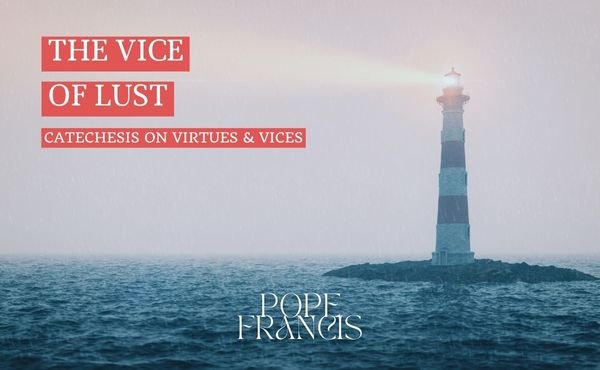Brothers and sisters, good morning!
And today, let us listen well to the catechesis, because afterwards there will be a circus that will perform for us. Let us continue our journey concerning vices and virtues; and the ancient Fathers teach us that, after gluttony, the second ‘demon’ – that is, vice – that is always crouching at the door of the heart is that of lust, called porneia in Greek. While gluttony is voracity with regard to food, this second vice is a kind of ‘voracity’ with regard to another person, that is, the poisoned bond that human beings have with each other, especially in the sphere of sexuality.
Be careful: in Christianity, there is no condemnation of the sexual instinct. There is no condemnation. A book of the Bible, the Song of Songs, is a wonderful poem of love between two lovers. However, this beautiful dimension, the sexual dimension, the dimension of love, of our humanity is not without its dangers, so much so that St Paul already had to address the issue in the First Epistle to the Corinthians. St Paul writes: “It is actually reported that there is immorality among you, and of a kind that is not found even among pagans” (5:1). The Apostle's reproach concerns precisely an unhealthy handling of sexuality by some Christians.
But let us look at the human experience, the experience of falling in love. There are so many newlyweds here: you can talk about this. Why this mystery happens, and why it is such a shattering experience in people's lives, none of us know. One person falls in love with another, falling in love just happens. It is one of the most astonishing realities of existence. Most of the songs you hear on the radio are about this: loves that shine, loves that are always sought and never attained, loves that are full of joy, or that torment us to the point of tears.
If it is not polluted by vice, falling in love is one of the purest feelings. A person in love becomes generous, enjoys giving gifts, writes letters and poems. He stops thinking of himself to be completely focused on the other. This is beautiful. And if you ask a person in love why they love, they won’t have an answer: In so many ways their love is unconditional, without any reason. You must have patience if that love, which is so powerful, is also a little naive: lovers does not really know the face of the other, they tends to idealise them, they are ready to make promises whose weight they don’t immediately grasp. This ‘garden’ where wonders are multiplied is not, however, safe from evil. It is defiled by the demon of lust, and this vice is particularly odious, for at least two reasons. At least two.
First, because it destroys relationships between peoples. To prove such a reality, unfortunately, the daily news is sufficient. How many relationships that began in the best of ways have then turned into toxic relationships, of possession of the other, lacking respect and a sense of limits? These are loves in which chastity has been missing: a virtue not to be confused with sexual abstinence – chastity is something different from sexual abstinence – but rather must be connected with the will never to possess the other. To love is to respect the other, to seek his or her happiness, to cultivate empathy for his or her feelings, to dispose oneself in the knowledge of a body, a psychology, and a soul that are not our own, and that must be contemplated for the beauty they bear. That is love, and love is beautiful. Lust, on the other hand, makes a mockery of all this: lust plunders, it robs, it consumes in haste, it does not want to listen to the other but only to its own need and pleasure; lust judges every courtship a bore, it does not seek that synthesis between reason, drive and feeling that would help us to conduct existence wisely. The lustful seeks only shortcuts: he does not understand that the road to love must be travelled slowly, and this patience, far from being synonymous with boredom, allows us to make our loving relationships happy.
But there is a second reason why lust is a dangerous vice. Among all human pleasures, sexuality has a powerful voice. It involves all the senses; it dwells both in the body and in the psyche, and this is very beautiful; but if it is not disciplined with patience, if it is not inscribed in a relationship and in a story where two individuals transform it into a loving dance, it turns into a chain that deprives human beings of freedom. Sexual pleasure that is a gift from God is undermined by pornography: satisfaction without relationship that can generate forms of addiction. We have to defend love, the love of the heart, of the mind, of the body, pure love in the giving of oneself to the other. And this is the beauty of sexual intercourse.
Winning the battle against lust, against the “objectification” of the other, can be a lifelong endeavour. But the prize of this battle is the most important of all, because it is preserving that beauty that God wrote into His creation when He imagined love between man and woman, which is not for the purpose of using one another, but of loving one another. That beauty that makes us believe that building a story together is better than going in search of adventures – there are so many Don Juans out there; building a story together is better than going in search of adventures; cultivating tenderness is better than bowing to the demon of possession – true love does not possess, it gives itself; serving is better than conquering. Because if there is no love, life is sad, it is sad loneliness.
